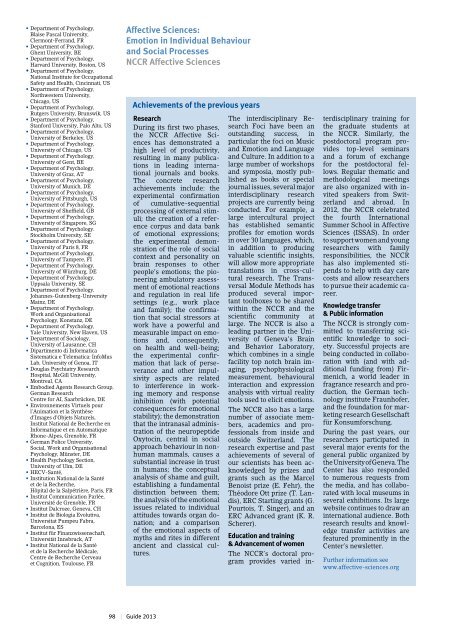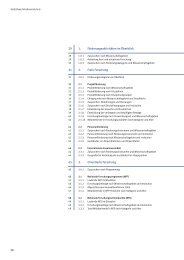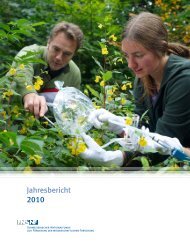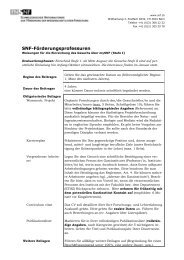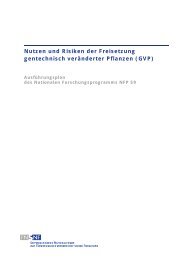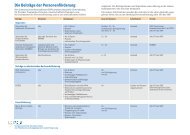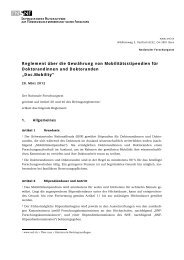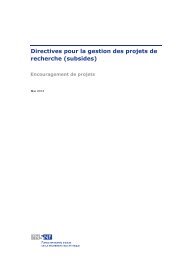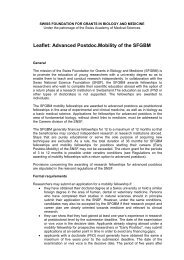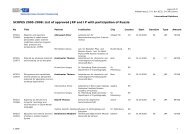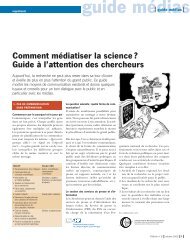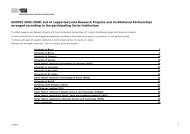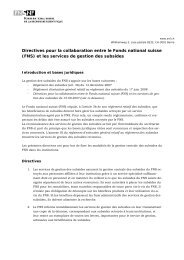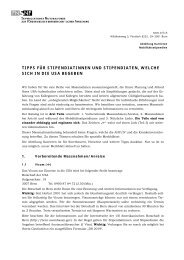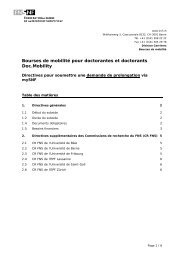NCCR Guide 2013 - Schweizerischer Nationalfonds (SNF)
NCCR Guide 2013 - Schweizerischer Nationalfonds (SNF)
NCCR Guide 2013 - Schweizerischer Nationalfonds (SNF)
Create successful ePaper yourself
Turn your PDF publications into a flip-book with our unique Google optimized e-Paper software.
• Department of Psychology,<br />
Blaise Pascal University,<br />
Clermont-Ferrand, FR<br />
• Department of Psychology,<br />
Ghent University, BE<br />
• Department of Psychology,<br />
Harvard University, Boston, US<br />
• Department of Psychology,<br />
National Institute for Occupational<br />
Safety and Health, Cincinnati, US<br />
• Department of Psychology,<br />
Northwestern University,<br />
Chicago, US<br />
• Department of Psychology,<br />
Rutgers University, Brunswik, US<br />
• Department of Psychology,<br />
Stanford University, Palo Alto, US<br />
• Department of Psychology,<br />
University of Berkeley, US<br />
• Department of Psychology,<br />
University of Chicago, US<br />
• Department of Psychology,<br />
University of Gent, BE<br />
• Department of Psychology,<br />
University of Graz, AT<br />
• Department of Psychology,<br />
University of Munich, DE<br />
• Department of Psychology,<br />
University of Pittsburgh, US<br />
• Department of Psychology,<br />
University of Sheffield, GB<br />
• Department of Psychology,<br />
University of Singapore, SG<br />
• Department of Psychology.<br />
Stockholm University, SE<br />
• Department of Psychology,<br />
University of Paris 8, FR<br />
• Department of Psychology,<br />
University of Tampere, FI<br />
• Department of Psychology,<br />
University of Würzburg, DE<br />
• Department of Psychology,<br />
Uppsala University, SE<br />
• Department of Psychology,<br />
Johannes-Gutenberg-University<br />
Mainz, DE<br />
• Department of Psychology,<br />
Work and Organisational<br />
Psychology, Konstanz, DE<br />
• Department of Psychology,<br />
Yale University, New Haven, US<br />
• Department of Sociology,<br />
University of Lausanne, CH<br />
• Dipartimento di Informatica<br />
Sistematica e Telematica: InfoMus<br />
Lab, University of Genoa, IT<br />
• Douglas Psychiatry Research<br />
Hospital, McGill University,<br />
Montreal, CA<br />
• Embodied Agents Research Group,<br />
German Research<br />
Centre for AI, Saarbrücken, DE<br />
• Environnements Virtuels pour<br />
l’Animation et la Synthèse<br />
d’Images d’Objets Naturels,<br />
Institut National de Recherche en<br />
Informatique et en Automatique<br />
Rhone-Alpes, Grenoble, FR<br />
• German Police University,<br />
Social, Work and Organisational<br />
Psychology, Münster, DE<br />
• Health Psychology Section,<br />
University of Ulm, DE<br />
• HECV-Santé,<br />
• Institution National de la Santé<br />
et de la Recherche,<br />
Hôpital de la Salpétrière, Paris, FR<br />
• Institut Communication Parlée,<br />
Université de Grenoble, FR<br />
• Institut Dalcroze, Geneva, CH<br />
• Institut de Biologia Evolutiva,<br />
Universitat Pumpeu Fabra,<br />
Barcelona, ES<br />
• Institut für Finanzwissenschaft,<br />
Universität Innsbruck, AT<br />
• Institut National de la Santé<br />
et de la Recherche Médicale,<br />
Centre de Recherche Cerveau<br />
et Cognition, Toulouse, FR<br />
Affective Sciences:<br />
Emotion in Individual Behaviour<br />
and Social Processes<br />
<strong>NCCR</strong> Affective Sciences<br />
Achievements of the previous years<br />
Research<br />
During its first two phases,<br />
the <strong>NCCR</strong> Affective Sciences<br />
has demonstrated a<br />
high level of productivity,<br />
resulting in many publications<br />
in leading international<br />
journals and books.<br />
The concrete research<br />
achievements include: the<br />
experimental confirmation<br />
of cumulative-sequential<br />
processing of external stimuli;<br />
the creation of a reference<br />
corpus and data bank<br />
of emotional expressions;<br />
the experimental demonstration<br />
of the role of social<br />
context and personality on<br />
brain responses to other<br />
people‘s emotions; the pioneering<br />
ambulatory assessment<br />
of emotional reactions<br />
and regulation in real life<br />
settings (e.g., work place<br />
and family); the confirmation<br />
that social stressors at<br />
work have a powerful and<br />
measurable impact on emotions<br />
and, consequently,<br />
on health and well-being;<br />
the experimental confirmation<br />
that lack of perseverance<br />
and other impulsivity<br />
aspects are related<br />
to interference in working<br />
memory and response<br />
inhibition (with potential<br />
consequences for emotional<br />
stability); the demonstration<br />
that the intranasal administration<br />
of the neuropeptide<br />
Oxytocin, central in social<br />
approach behaviour in nonhuman<br />
mammals, causes a<br />
substantial increase in trust<br />
in humans; the conceptual<br />
analysis of shame and guilt,<br />
establishing a fundamental<br />
distinction between them;<br />
the analysis of the emotional<br />
issues related to individual<br />
attitudes towards organ donation;<br />
and a comparison<br />
of the emotional aspects of<br />
myths and rites in different<br />
ancient and classical cultures.<br />
The interdisciplinary Research<br />
Foci have been an<br />
outstanding success, in<br />
particular the foci on Music<br />
and Emotion and Language<br />
and Culture. In addition to a<br />
large number of workshops<br />
and symposia, mostly published<br />
as books or special<br />
journal issues, several major<br />
interdisciplinary research<br />
projects are currently being<br />
conducted. For example, a<br />
large intercultural project<br />
has established semantic<br />
profiles for emotion words<br />
in over 30 languages, which,<br />
in addition to producing<br />
valuable scientific insights,<br />
will allow more appropriate<br />
translations in cross-cultural<br />
research. The Transversal<br />
Module Methods has<br />
produced several important<br />
toolboxes to be shared<br />
within the <strong>NCCR</strong> and the<br />
scientific community at<br />
large. The <strong>NCCR</strong> is also a<br />
leading partner in the University<br />
of Geneva‘s Brain<br />
and Behavior Laboratory,<br />
which combines in a single<br />
facility top notch brain imaging,<br />
psychophysiological<br />
measurement, behavioural<br />
interaction and expression<br />
analysis with virtual reality<br />
tools used to elicit emotions.<br />
The <strong>NCCR</strong> also has a large<br />
number of associate members,<br />
academics and professionals<br />
from inside and<br />
outside Switzerland. The<br />
research expertise and past<br />
achievements of several of<br />
our scientists has been acknowledged<br />
by prizes and<br />
grants such as the Marcel<br />
Benoist prize (E. Fehr), the<br />
Théodore Ott prize (T. Landis),<br />
ERC Starting grants (G.<br />
Pourtois, T. Singer), and an<br />
ERC Advanced grant (K. R.<br />
Scherer).<br />
Education and training<br />
& Advancement of women<br />
The <strong>NCCR</strong>‘s doctoral program<br />
provides varied interdisciplinary<br />
training for<br />
the graduate students at<br />
the <strong>NCCR</strong>. Similarly, the<br />
postdoctoral program provides<br />
top-level seminars<br />
and a forum of exchange<br />
for the postdoctoral fellows.<br />
Regular thematic and<br />
methodological meetings<br />
are also organized with invited<br />
speakers from Switzerland<br />
and abroad. In<br />
2012, the <strong>NCCR</strong> celebrated<br />
the fourth International<br />
Summer School in Affective<br />
Sciences (ISSAS). In order<br />
to support women and young<br />
researchers with family<br />
responsibilities, the <strong>NCCR</strong><br />
has also implemented stipends<br />
to help with day care<br />
costs and allow researchers<br />
to pursue their academic career.<br />
Knowledge transfer<br />
& Public information<br />
The <strong>NCCR</strong> is strongly committed<br />
to transferring scientific<br />
knowledge to society.<br />
Successful projects are<br />
being conducted in collaboration<br />
with (and with additional<br />
funding from) Firmenich,<br />
a world leader in<br />
fragrance research and production,<br />
the German technology<br />
institute Fraunhofer,<br />
and the foundation for marketing<br />
research Gesellschaft<br />
für Konsumforschung.<br />
During the past years, our<br />
researchers participated in<br />
several major events for the<br />
general public organized by<br />
the University of Geneva. The<br />
Center has also responded<br />
to numerous requests from<br />
the media, and has collaborated<br />
with local museums in<br />
several exhibitions. Its large<br />
website continues to draw an<br />
international audience. Both<br />
research results and knowledge<br />
transfer activities are<br />
featured prominently in the<br />
Center‘s newsletter.<br />
Further information see<br />
www.affective-sciences.org<br />
98 | <strong>Guide</strong> <strong>2013</strong>


